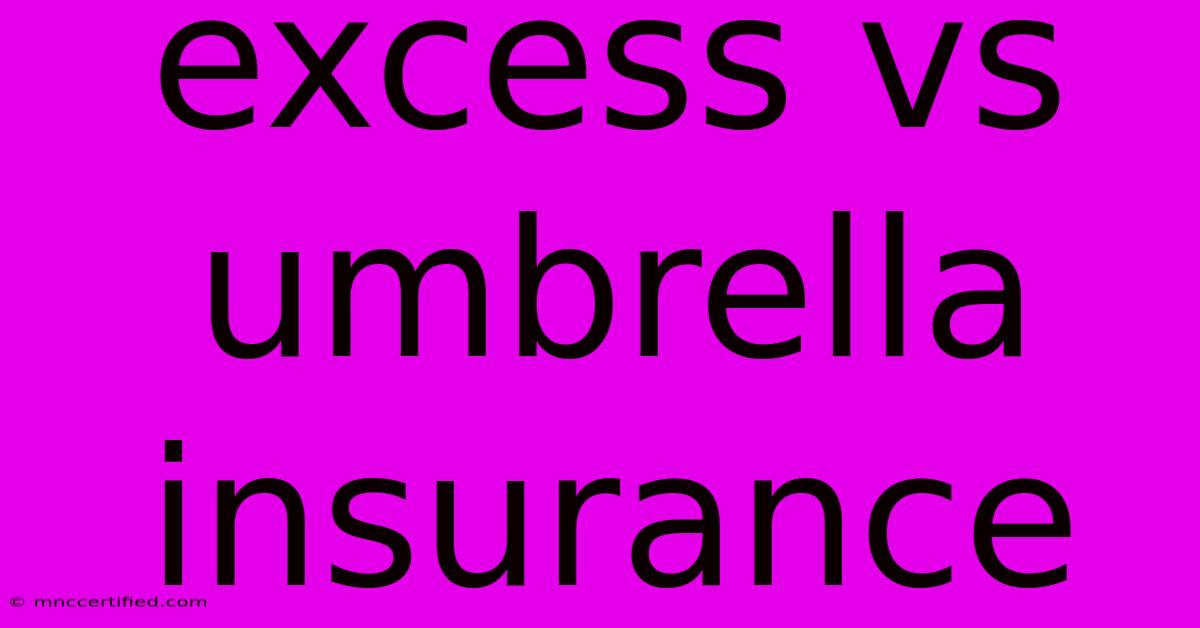Excess Vs Umbrella Insurance

Table of Contents
Excess vs. Umbrella Insurance: What's the Difference?
Choosing the right insurance coverage is crucial for protecting your assets and financial well-being. Two types of insurance often cause confusion: excess liability insurance and umbrella insurance. While both offer additional liability coverage beyond your primary policies (like auto and homeowner's insurance), they differ significantly in how they work and the situations where they're most beneficial. This article will clarify the key differences between excess and umbrella insurance, helping you make an informed decision about which—or both—might be right for you.
Understanding Excess Liability Insurance
Excess liability insurance, sometimes called excess insurance, provides additional coverage on top of your existing liability policies. Think of it as a layer of protection that kicks in after your primary insurance policy's limits are exhausted. It only covers liabilities that exceed your primary policy's limits.
Key Characteristics of Excess Liability Insurance:
- Follows Form: Excess policies typically "follow form," meaning they mirror the coverage provided by your underlying policy. If your primary policy doesn't cover a specific liability, neither will your excess policy.
- Specific to a Policy: Excess liability insurance is usually purchased for a specific policy, such as your auto insurance or homeowner's insurance. You might have separate excess policies for each.
- Higher Deductibles: Excess policies often come with higher deductibles than umbrella policies.
- Targeted Coverage: It's ideal for those who need to significantly increase coverage for a specific risk, rather than broadly expanding their liability protection.
Understanding Umbrella Insurance
Umbrella insurance provides broader liability protection that extends beyond your existing policies. It acts as a "safety net," offering additional coverage for various liabilities, including those not covered by your primary policies or those that exceed their limits.
Key Characteristics of Umbrella Insurance:
- Broader Coverage: An umbrella policy covers a wider range of liabilities, including those related to auto accidents, homeowner's liability, personal injury, and even libel and slander.
- Higher Coverage Limits: Umbrella policies offer significantly higher coverage limits than typical excess policies, often ranging from $1 million to $5 million or more.
- Lower Deductibles (Typically): Umbrella policies generally have lower deductibles compared to excess policies.
- Comprehensive Protection: It provides comprehensive liability protection across multiple areas, offering a more holistic approach to risk management.
Excess vs. Umbrella Insurance: A Head-to-Head Comparison
| Feature | Excess Liability Insurance | Umbrella Insurance |
|---|---|---|
| Coverage Type | Adds coverage on top of existing policies | Broader coverage beyond existing policies |
| Coverage Limit | Limited to the amount purchased; specific policy | Significantly higher, often millions of dollars |
| Deductible | Typically higher | Typically lower |
| Coverage Scope | Mirrors the underlying policy's coverage | Covers a wider range of liabilities |
| Best For | Increasing coverage for a specific high-risk policy | Broad liability protection across multiple areas |
Which One Do You Need?
The best choice depends on your individual needs and risk profile.
-
Excess Liability Insurance: Consider this if you have a high-value asset (like a business) and need substantially more liability coverage for that specific area. For instance, a contractor might need excess liability coverage on their commercial auto insurance.
-
Umbrella Insurance: This is a better option for individuals with significant assets who want broader liability protection across multiple areas, offering peace of mind against unexpected lawsuits or accidents. Professionals, high-net-worth individuals, and families with significant assets should strongly consider umbrella insurance.
Frequently Asked Questions (FAQs)
Q: Can I have both excess and umbrella insurance?
A: Yes, you can have both. An umbrella policy often acts as the top layer, providing additional coverage after your primary policies and any excess policies are exhausted.
Q: How much does umbrella insurance cost?
A: The cost varies based on your coverage limits, location, and risk profile. It's generally more affordable than you might expect, given the substantial liability protection it provides.
Q: Is umbrella insurance worth it?
A: For many individuals and families, especially those with significant assets, umbrella insurance provides invaluable protection against potentially devastating financial losses from lawsuits.
By understanding the differences between excess and umbrella insurance, you can make an informed decision about which type of coverage best suits your specific circumstances and helps safeguard your financial future. Consult with an insurance professional to determine the best coverage for your individual needs.

Thank you for visiting our website wich cover about Excess Vs Umbrella Insurance. We hope the information provided has been useful to you. Feel free to contact us if you have any questions or need further assistance. See you next time and dont miss to bookmark.
Featured Posts
-
Black Friday Apple Deals 2024
Nov 30, 2024
-
Global Supply Chain Management Software Market
Nov 30, 2024
-
Kneecap Funding Illegal Uk Government Action
Nov 30, 2024
-
Josh Allen Proposes To Hailee Steinfeld
Nov 30, 2024
-
Well Point Insurance Reviews
Nov 30, 2024